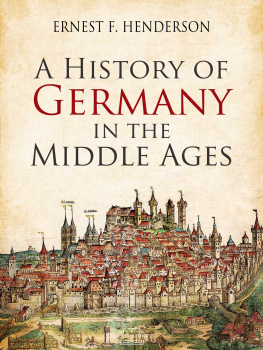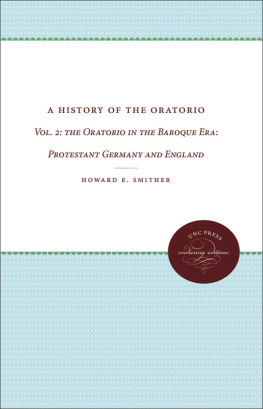GERMANY IN THE EARLY MIDDLE AGES
Longman History of Germany
Germany in the early middle ages c. 8001056
Timothy Reuter
Germany under the Old Regime, 16001790
John Gagliardo
Germany in the
early middle ages
c. 8001056
Timothy Reuter
First published 1991 by Addison Wesley Longman Limited
Fourth impression 1998
Published 2013 by Routledge
2 Park Square, Milton Park, Abingdon, Oxon OX14 4RN
711 Third Avenue, New York, NY 10017, USA
Routledge is an imprint of the Taylor & Francis Group, an informa business
Copyright 1991, Taylor & Francis.
All rights reserved. No part of this book may be reprinted or reproduced or utilised in any form or by any electronic, mechanical, or other means, now known or hereafter invented, including photocopying and recording, or in any information storage or retrieval system, without permission in writing from the publishers.
Notices
Knowledge and best practice in this field are constantly changing. As new research and experience broaden our understanding, changes in research methods, professional practices, or medical treatment may become necessary.
Practitioners and researchers must always rely on their own experience and knowledge in evaluating and using any information, methods, compounds, or experiments described herein. In using such information or methods they should be mindful of their own safety and the safety of others, including parties for whom they have a professional responsibility.
To the fullest extent of the law, neither the Publisher nor the authors, contributors, or editors, assume any liability for any injury and/or damage to persons or property as a matter of products liability, negligence or otherwise, or from any use or operation of any methods, products, instructions, or ideas contained in the material herein.
ISBN 13: 978-0-582-49034-5 (pbk)
British Library Cataloguing-in-Publication Data
Reuter, Timothy.
Germany in the early Middle Ages c. 8001056
1. Germany 8431519
I. Title
943.02
Library of Congress Cataloging-in-Publication Data
Reuter, Timothy.
Germany in the early middle ages, c. 800-1056/Timothy Reuter.
p. cm.
Includes bibliographical references and index.
1. Germany History T 843. 2. Germany History 8431273.
I. Title.
DD126.R48 1991
943-dc20
90-46393
CIP
Contents
MAPS
TABLES
| Adam of Bremen | Magistri Adam Bremensis Gesta Hammaburgensis ecclesiae pontificum ed. B. Schmeidler (MGH SRG, Hannover 1917) |
| AfD | Archiv fr Diplomatik |
| AHC | Annuarium Historiae Conciliorum |
| AHVNRh | Annalen des historischen Vereins fr den Niederrhein |
| Annales Fuldenses | Annales Fuldenses, ed. F. Kurze (MGH SRG, Hannover 1891) |
| BDLG | Bltter fr deutsche Landesgeschichte |
| CCM | Cahiers de civilisation mdivale |
| D | Diploma; the reference is by convention to the diplomata editions in the MGH series by number and ruler, thus D H II 143 is no. 143 in the edition of Henry IIs diplomata |
| DA | Deutsches Archiv fr Erforschung des Mittelalters |
| EHR | English Historical Review |
| Einhard | Einhardi Vita Karoli, ed. G. Waitz and O. Holder-Egger (MGH SRG, Hannover 1911) |
| FmaSt | Frhmittelalterliche Studien |
| HJb | Historisches Jahrbuch |
| HJLG | Hessisches Jahrbuch fr Landesgeschichte |
| HZ | Historische Zeitschrift |
| JEccIH | Journal of Ecclesiastical History |
| JFLF | Jahrbuch fr frnkische Landesforschung |
| JGF | Jahrbuch fr die Geschichte des Feudalismus |
| JGMOD | Jahrbuch fr die Geschichte Mittel- und Ostdeutschlands |
| JwLG | Jahrbuch fr westdeutsche Landesgeschichte |
| Liutprand, Antapodosis | Liudprandi Opera, ed. J. Becker (MGH SRG, Hannover 1915) |
| MGH | Monumenta Germaniae Historica |
| SRG | Scriptores rerum Germanicarum |
| SRG NS | Scriptores rerum Germanicarum, nova series |
| SS | Scriptores in folio |
| MIG | Mitteilungen des Instituts fr sterreichische Geschichtsforschung (EB = Ergnzungsband) |
| NJLJ | Niederschisches Jahrbuch fr Landesgeschichte |
| QFIAB | Quellen und Forschungen aus italienischen Archiven und Bibliotheken |
| Regino | Reginonis abbatis Prumiensis Chronicon ed. F. Kurze (MGH SRG, Hannover 1890) |
| RhVjbll | Rheinische Vierteljahrsbltter |
| Settimane | Settimane di studi sullalto medio evo |
| Thietmar | Thietmari episcopi Merseburgensis Chronicon, ed. R. Holtzmann (MGH SRG NS 9, Berlin 1935) |
| TRHS | Transactions of the Royal Historical Society |
| VSWG | Vierteljahrsschrift fr Sozial- und Wirtschaftsgeschichte |
| VuF | Vortrge und Forschungen herausgegeben vom Konstanzer Arbeitskreis fr mittelalterliche Geschichte |
| Widukind | Widukindi monaci Corbeiensis rerum gestarum Saxonicarum libri tres, ed. H.-E. Lohmann and P. Hirsh (MGH SRG, Hannover 1935) |
| Wipo | Wiponis Gesta Chuonradi in Wiponis Opera, ed. H. Bresslau (MGH SRG, Hannover 1915) |
| ZBLG | Zeitschrift fr bayerische Landesgeschichte |
| ZfG | Zeitschrift fr Geschichtswissenschaft |
| ZGO | Zeitschrift fr die Geschichte des Oberrheins |
| ZKG | Zeitschrift fr Kirchengeschichte |
| ZRGGA | Zeitschrift der Savigny-Stiftung fr Rechtsgeschichte, Germanistische Abteilung |
| ZRGKA | Zeitschrift der Savigny-Stiftung fr Rechtsgeschichte, Kanonistische Abteilung |
| ZWLG | Zeitschrift fr wrttembergische Landesgeschichte |
Nemo autem a nobis sententias aut moralitates expectet.
Otto of Freising,
Chronica, prologue to Book 2
Selbstverstndlich wird man immer eine eindeutige Entscheidung suchen, und das tue ich im folgenden auch. Aber man mu dabei zusehen, wieweit es berhaupt mglich ist, sie zu finden, und jenes Suchen scheint mix hufig in die Irre zu fhren, indem es etwas wissen will und u. U. auch zu wissen vorgibt, was man nicht wissen kann.
Martin Lintzel
Miszellen zur Geschichte des zehnten Jahrhunderts
This book is the first part of a history of Germany in the early and high middle ages. The present volume stops on the eve of the great crisis of the late eleventh century; many early eleventh-century developments which were to become of real significance only during this crisis have been merely noted here, and will be treated more fully in a successor volume. This is intended to take the story on to the mid fourteenth century, when Golden Bull and Black Death provide a convenient place to stop. The book is an attempt by someone who has been trained and has worked in both an English-speaking and a German-speaking scholarly environment to convey and interpret the work of the latter to the former. This has not always been easy. I find that my vulgar English pragmatism has prevented me from believing too strongly in some of the more ethereal constructions of German medieval scholarship, but readers in the Anglo-Saxon world may still find some of what remains ethereal enough. Besides this, the political implications of the German middle ages are not so easily dismissed, even today. As a politically conscious being who currently lives in Germany I have my own views on the German present and the way in which the German past has led to it, but I have tried not to let these intrude into my account of the ninth, tenth and eleventh centuries. Still less have I felt tempted to interpret such obvious Good Things as Charles the Great or Otto I as prototypes for whatever policy is currently fashionable, having seen how often (and for what different policies) this has been done in the past.









